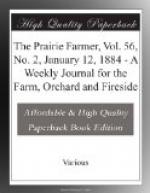At the residence of Thomas Barker, three miles from this village, two people were to-day made man and wife. William Craig left his pretty girl sweetheart in a fit of jealous anger on the eve of Dec. 9, 1863, returned a week or two since, found his betrothed still single and true, and this afternoon the long deferred marriage was consummated. All the surviving friends of their youth were present, and many half forgotten associates came from neighboring towns and farms to join in the merrymaking.
Twenty years ago Will Craig worked on his father’s farm near here during the day and spent his evenings at the residence of a farmer neighbor. The attraction was Mary Barker, a pretty seventeen-year old girl. Craig was deeply in love and so was Mary, but like many other girls she liked to play the coquette occasionally.
Their wedding-day was set for Christmas, 1863, and the prospective bride felt secure. One evening, however, the pretty Mary pushed her coquetry too far. On December 7, 1863, Farmer Barker gave an old-fashioned “sociable” in honor of his daughter’s approaching wedding. Craig was there, of course, but his happiness was marred by the presence of a Pittsburg youth—a new comer. Mary allowed this young man to pay her many attentions.
Craig was madly jealous. After all his attention he thought his betrothed showed too much regard for his rival, and as she only laughed at his pleadings he grew angry and threatened to leave. Her seeming indifference made him desperate, and he declared:
“If you dance once more with that fellow you will not see me again for twenty years.”
“You couldn’t leave me for even twenty hours if you tried ever so hard,” she replied, and with a coquettish smile she went off to dance with his rival.
Craig went home alone that night and the next day was missing. The most careful search failed to reveal any trace of him. The old couple continued to till the farm without the aid of the strong-armed son, and at the neighbor’s down the road pretty Mary Barker went about her household labors with a demure air that told plainly how she regarded her lover’s disappearance. She refused to “keep company” in the old-fashioned way with any of the young farmers who would willingly have taken young Craig’s place. She went out very little, kept a cat and grew domestic in her habits. She had an abiding faith that Craig would return, and to all entreaties would only shake her head and say: “I am waiting for Will.” The firm contour of the cheek grew somewhat less rounded, the springing step less elastic, but she would not think of marriage.
Friday, December 7, of this month (December) was just twenty years since the disappearance of William Craig. In the twilight a bearded man of forty came up the walk and as Miss Barker opened the door he put out both hands and said:
“Mary, I have come again.”
“I am sorry you waited so long Will,” was the quiet reply, as she led him into the house, where each told the story of the weary waiting, and Christmas was fixed upon once more as the day for the wedding.




